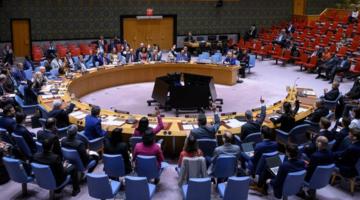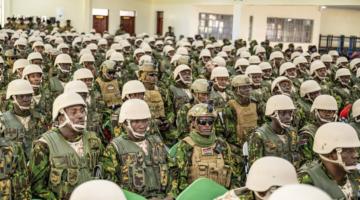Remembering when Auntie Maxine Waters testified for Haiti, and against the US coup-mongering gangsters.
After more than two years of persistent effort, the U.S. finally has its much-desired foreign military invasion and occupation of Haiti. This time, the proxies will not be UN soldiers (the vaunted but violent “peacekeeping” forces), but U.S.-funded paid police and soldiers –mercenaries, effectively– from Kenya, Benin, Barbados, Jamaica, and other Black countries.
The western media, imperial stenographers that they are, represent the coming invasion as a fait accompli. Gone are the over-the-top stories of a Haiti engulfed in flames, consumed by violence, and stricken with cannibalism – all the usual, ubiquitous racist tropes of Black terror that are used to manufacture consent for an invasion and justify the desperate calls for the U.S. and the white west to once again “save” Haiti. Instead, we now have discussions about the many military planes carrying heavy equipment landing daily in Haiti, about the military base being built, ostensibly to house the foreign mercenaries, about the destruction of almost 400 houses of poor Haitians who happened to live near the airport to create a “safe zone” for the mission, and about this mission being “Kenya-led.”
Of course, in the new narrative being sold, the western imperialists expect their gullible populations to believe that the source of Haiti’s current predicament is internal; it’s the “gangs,” they are told, those monsters, that are responsible for what is happening in Haiti today. And another brutal invasion with big guns and tanks supplied by the U.S. will solve all of Haiti’s problems – just as all the other previous military invasions of Haiti were going to solve all of Haiti’s problems. It goes without saying that they did not, in fact, solve any of Haiti’s problems.
The imperial stenographers, however, don’t bother with real historical and journalistic research about Haiti. Doing so would quickly reveal that the true monsters for Haiti, the true gangsters, are the U.S. government and its minions. Doing so would reveal that the current unstable political situation in Haiti has its origins decades ago in the criminal actions of the U.S. government, especially in the 2004 U.S.-France-Canada-backed coup d’état against Haiti’s democratically elected government. The coup was planned in 2003 in Ottawa, Canada, and consecrated by the United Nations military mission and occupation. This historical context reveals the ongoing foreign meddling in Haiti. Through this meddling, the results of the 2011 elections were changed and an illegitimate president and a corrupt political party were imposed on Haiti, and then, in 2021, a criminal prime minister from the same political party was brought to power. Through this meddling, certain “gangs” were federated and effectively made a part of the state while gun trafficking from the US to Haiti was ignored. This meddling also forced the removal of fuel subsidies, pushing an already impoverished population into economic and social desperation.
Unlike today, in 2004, Haiti had defenders. They were few, but they knew the true cause of the violence and instability that engulfed Haiti after February 29th. One of these defenders was U.S. Congresswoman Maxine Waters of California. The most senior of 13 Black women serving in Congress, and a one time chair of the Congressional Black Caucus, Waters was among the few voices opposing the 2004 coup d’état in Haiti. Waters pointed to the roles of Haitian oligarch Andre Apaid and the opposition Group 184 in the coup. She also reminded us that Apaid had been working to destabilize Haiti since the country’s first democratic elections in 1991 were overturned by a CIA-led coup. Most significantly, Waters accused the U.S. of involvement in the 2004 coup, pointing to the criminal role of the U.S. Ambassador to Haiti, Roger Noriega.
Soon after the 2004 coup, Waters testified before the U.S. Senate Committee on Foreign Relations in an effort to spur an investigation into the US role in regime change in Haiti. “I am convinced,” she said, “that the recent coup not involved not only Adre Apaid and the armed thugs but also our own Ambassador Roger Noriega. Noriega’s history is replete with actions against Haiti.” Waters’s conviction about US complicity in 2004 - the coup that led to the military occupation and the full destruction of the Haitian state – were affirmed with the release of the Wikileaks papers.
As the U.S. is about to lead its proxy military forces to brutalize Haitian people – again – we reprint Waters’s testimony. Today, Haiti does not have such powerful friends and supporters. Waters has been tepid in her response to the current calamity and the U.S.’s ill-conceived and illegal invasion. Even so, her 2004 testimony is important today for two key reasons: first, it demonstrates the gangsterism of the U.S.; second, it points to when at least one member of the Congressional Black Caucus stood up against U.S. racist imperialism and malevolence towards Haiti.
Testimony before the Senate Committee on Foreign Relations on the role of the U.S. government in the overthrow of the democratically-elected government of Haiti during a hearing on "Charting the Future of U.S.-Haitian Relations.”
Congresswoman Maxine Waters
Senator Lugar, Senator Coleman, Senator Biden, Senator Dodd, members of the Senate Foreign Relations Committee, thank you for allowing me to testify here today. It is clear that a coup d'etat took place in Haiti. We have learned that our government made the departure of President Jean-Bertrand Aristide, the democratically-elected leader of Haiti, a pre-condition to introducing United States forces to restore order. At the very least, despite our government's claims to support democratically-elected governments, the Bush Administration was unwilling to take any real steps to prevent President Aristide's overthrow.
Uncovering the truth about our government's role in President Aristide's departure is critical to any attempt to chart the future of U.S.-Haitian relations.
I have been involved in U.S. policy towards Haiti since shortly after President Aristide was ousted in a coup d'etat in 1991. I became acquainted with President Aristide while he was in exile here in the United States following the 1991 coup. I joined with other Members of Congress to convince the Clinton Administration to intervene to allow President Aristide to return to Haiti and resume his position as the democratically-elected President of Haiti. As a result of our efforts, President Aristide was able to return to Haiti in 1994.
Mr. Chairman, the sad reality is that the same people who supported the 1991 coup were involved in planning this year's coup. Andre Apaid, a factory-owner who holds an American passport, supported the 1991 coup and is now the leader of the Group of 184. Many of the thugs are former members of the Haitian military or members of the feared death squad known as the Front for the Advancement and Progress of Haiti (FRAPH), which was responsible for numerous human rights violations during the three years following the 1991 coup. Louis Jodel Chamblain was the second-in-command of FRAPH and was convicted in absentia for his role in the 1994 Raboteau massacre and the 1993 assassination of Antoine Izmery. Jean Tatoune was a local FRAPH leader, who was also convicted of involvement in the Raboteau massacre. Guy Philippe is a former police chief and military officer, who led several coup attempts between 2001 and 2003.
I am convinced that the recent coup involved not only Andre Apaid and the armed thugs but also our own Ambassador Roger Noriega. Ambassador Noriega's history is replete with actions against Haiti, both as Senator Jesse Helms' chief of staff and now as the Bush Administration's Assistant Secretary for Western Hemisphere Affairs.
I have been to Haiti three times since the beginning of this year. While I was in Haiti, I met with President Aristide and Lavalas party members as well as Andre Apaid and other members of the Group of 184. I was also present when the international community and the members of CARICOM presented the CARICOM proposal to President Aristide. The CARICOM proposal was designed to limit President Aristide's power and provide for the selection of a new prime minister, who would be acceptable to the opposition and able to exercise more independent power in Haiti.
I believe the demonstrations organized by Andre Apaid and the Group of 184 were designed to provoke the Haitian police into retaliating against the demonstrators, who routinely threw rocks, spat in the face of police officers and defied government orders establishing permissible parade routes for protests. In the beginning, these tactics worked and the police responded. However, when President Aristide learned what was happening, he was able to control the police and prevent them from carrying out acts of retaliation.
When the police stopped responding to provocations by the demonstrators, I believe the U.S. government and the French government became involved in exerting increasing pressure on President Aristide, by refusing to fully support the CARICOM proposal and covertly supporting the thugs, who were taking over cities and cutting off supplies of food and water. Meanwhile, the thugs became bolder and bolder, threatening to carry out a bloodbath if President Aristide did not leave Haiti. Yet neither Andre Apaid nor the U.S. government ever admitted they knew who these thugs were or denounced their invasion of Haiti.
I repeatedly appealed to Secretary of State Colin Powell to assist the government of Haiti, yet the Bush Administration refused to provide any assistance whatsoever to stop the violence until after President Aristide's departure. It is clear that President Aristide's departure was a pre-condition to any U.S. efforts to stop the violence. President Aristide told me that he was forced to leave Haiti on February 29, 2004, after U.S. officials told him that he and many other Haitians would be killed if he refused. President Aristide apparently is being held against his will in the Central African Republic.
I urge the members of the Senate Foreign Relations Committee to investigate the circumstances under which President Aristide and his wife are being held in order to ensure that they are not being held against their will. The United States should inform the government of the Central African Republic that President Aristide should be allowed to leave the Central African Republic whenever he is ready to do so. Furthermore, the United States should make certain that he is allowed to travel to any country of his own choosing that will receive him and offer him assistance in doing so.
The members of the Senate Foreign Relations Committee must determine the truth about our government's role in the organization and execution of the coup d'etat that lead to President Aristide's departure. The American people deserve to know how and why this Administration allowed a democratically-elected government to be overthrown by a group of heavily-armed thugs.
Statement of Honorable Maxine Waters, U.S. Representative from California, A Fresh Start for Haiti? Charting the Future of U.S.-Haitian Relations. Hearing before the Subcommittee on Western Hemisphere, Peace Corps and Narcotic Affairs of the Committee on Foreign Relations. United States Senate. One Hundred Eighth Congress, Second Session, March 10, 2004.



















